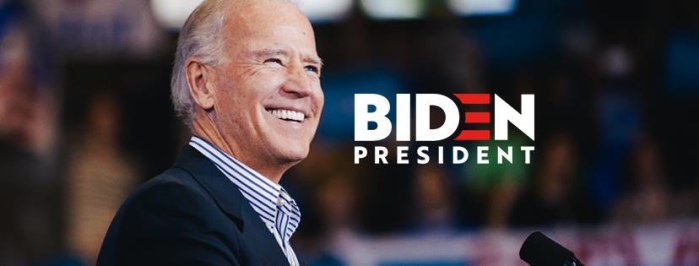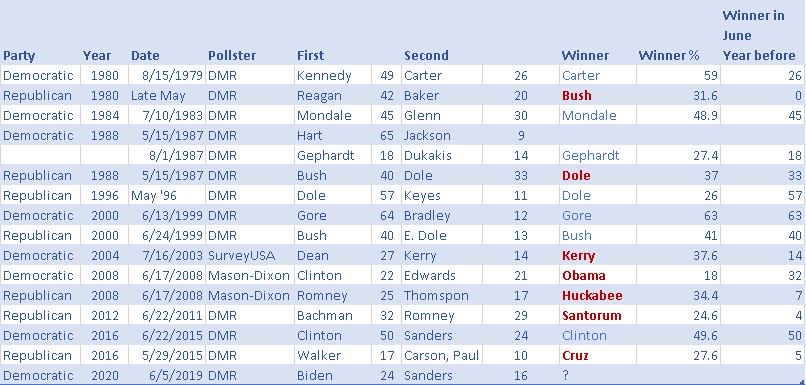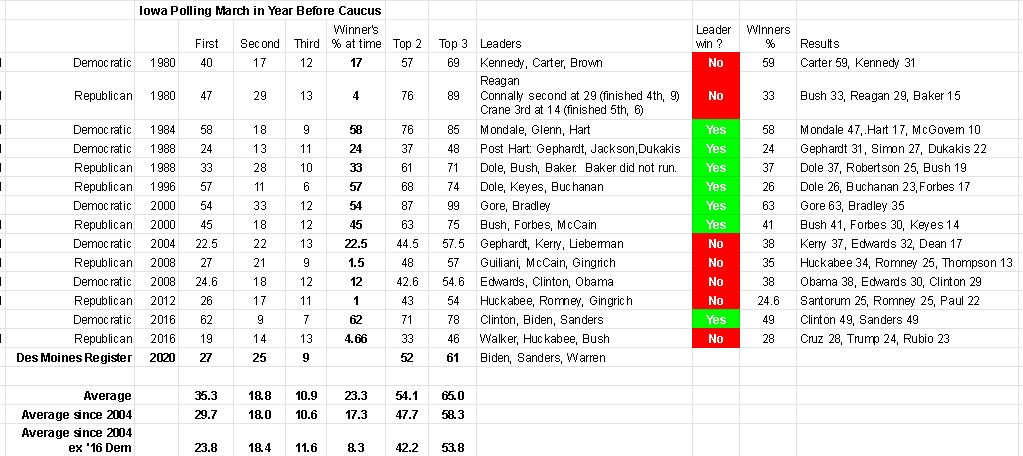Dan Guild examines what history tells us about how to interpret the latest Iowa Democratic caucus poll by Selzer & Co for the Des Moines Register, Mediacom, and CNN. -promoted by Laura Belin
It has been two months since the last good Iowa caucus poll. This is actually unusual: you have to go back to 1996 to find a similar gap. So the latest poll by Selzer & Co (what does the Des Moines Register have against Saturday nights?) was eagerly anticipated.
Joe Biden announced his candidacy to great fanfare on April 25. Within two weeks, national polling showed him picking up between 10 and 15 points. But there is no national primary. I wrote here in March that I Biden was a VERY weak front runner based on his Iowa polling to date.
Ed Kilgore speculated around the time of Biden’s announcement that he had a “shock and awe” strategy.
Did that strategy work? Has it moved votes in Iowa?
Tonight the Des Moines Register provided its verdict: No.
This table includes only pollsters with some sort of track record. Incredibly, Biden’s performance in the most recent poll is his WORST. After all of the national publicity he has received since his announcement, the two-term vice president in Barack Obama’s administration cannot break 25 percent. (We will get to the other candidates in a moment).
How bad are Biden’s numbers? Here is polling from roughly this point in the cycle for every competitive Iowa caucus since 1980.
Who are the most similar candidates?
Ronald Reagan sought the nomination in 1976 and was arguably the natural GOP nominee. Walter Mondale had been Jimmy Carter’s vice president. George Bush held that position in the Reagan administration. Bob Dole was a former nominee for VP. Gore was a two-term VP.
Every one of those candidates was over 40 in Iowa at this point. Biden is at least 16 points behind them. As I noted in March, only one of the last four front runners in Iowa who were under 30 percent early on went on to win the caucuses.
There are a couple of counterexamples. Hillary Clinton was at 22 percent in Iowa early in the campaign before the 2008 caucuses (close to where Biden is now). She nearly won the nomination that year but finished third in Iowa. John Kerry led Iowa in early 2003 and came back to win. Mitt Romney lost Iowa in 2012 and still won the nomination (but the GOP track record in Iowa is very different from that of the New Hampshire primary).
Equally interestingly, behind Biden are two candidates who are surging. I went back and looked: Pete Buttigieg’s surge in Iowa is pretty unique. To reach 15 percent in Iowa is an astonishing accomplishment. Similarly, Elizabeth’s Warren’s momentum is obvious, and other polling has found a similar upward trend for her. Conversely, Bernie Sanders has largely stagnated. Second-place candidates do not have a good record in Iowa when they are as well known as he is.
It would be a mistake, though, to focus on those four. In 2008, 2012, and 2016, the eventual Republican Iowa caucus winner struggled to break 5 percent at this point.
The latest Selzer poll asked respondents whom they were actively considering, as well as their first and second choices. When you look at the totals, candidates who appear to have little traction in Iowa are in the mix. Cory Booker, Kamala Harris, Beto O’Rourke, and Amy Klobuchar have all made enough of an impression at this point to be considered by large numbers of Iowa Democrats, even though their first-choice numbers are low.
We know from exit polls in 2004, 2008 and 2016 that at least 60 percent of voters will not make up their mind until the last month. Any of these candidates have a very realistic shot at winning Iowa. And I would be surprised if another candidate who is not in this group does not surge.
History tells us Biden will probably lose Iowa. History and this poll also tell us Iowa is wide open and likely to be very unpredictable.






5 Comments
I agree
that Biden’s numbers are more likely to keep slipping than to improve as the others become better known. I was surprised to see this big a drop for Sanders, though it’s not surprising because both Warren and Buttigieg are in different ways competing for his niche.
Like you, I was struck by the “actively considering” numbers for Booker (36 percent), O’Rourke (33 percent), Harris (32 percent), and Klobuchar (29 percent). Any of them could surge later, as could someone not registering now, if a breakout moment happens (as with Buttigieg’s CNN town hall in March).
Laura Belin Sun 9 Jun 12:47 AM
Booker in particular
is an interesting case. In NH his chair was Obama’s 2008 chair. People I talk to who have seen him come away very impressed. Beto’s numbers on the top line have collapsed both nationally and in the early states, but people still remain interested in his candidacy.
Dan Guild Sun 9 Jun 10:44 AM
The Dilution Factor
Ending the piece with the disclaimer that everyone is in play at this point and the race is unpredictable kind of negates the premise that history is any kind of indicator here.
I would love to see a backward-looking analysis factoring in sheer numbers of declared nominee candidates at this point and the ability to juke “name recognition” by means of social media. We simply don’t have much of a historic basis for our current situation.
If anything, new media seems to enable inflated support for candidates who are likely not viable past a certain point. The “Instagram Effect,” wherein no-name individuals can achieve “influencer” status only to be cast aside once they become passe’ or deviate from orthodoxy in any way is entirely in play here. At some point the influencer becomes the influenced, slaves to their followers’ collective expectations.
The first time “Mayor Pete” violates the passions of his acquired tribe when some unpalatable quote from his past surfaces or he takes some stance deemed too moderate, his trajectory may flatten as Beto O’Rourke’s seems to have, or he will reach the natural limit of his own uniqueness a’ la Andrew Yang.
The advantage of the elders in this race is experience playing the long game, while the Progressive wing of the party has grown up with “swiping left,” and “Thank you. Next.”
Jeff Clothier Sun 9 Jun 7:25 AM
I will add the number
of candidates to this analysis in a later post.
I would note that the comparison of 2016 to 2020 is illuminating in another respect. Clinton was able to largely clear the field of obvious contenders.
Biden simply did not scare potential candidates in the way Clinton did.
Dan Guild Sun 9 Jun 10:41 AM
history suggests
that people who start from a low base can win the Iowa caucuses. But the “actively considering” numbers from this poll indicate that not everyone now polling at 0-2 percent has the same potential to move up.
Laura Belin Sun 9 Jun 1:06 PM